Key takeaways:
- Eco-car washing utilizes waterless solutions and biodegradable products, significantly reducing water consumption and environmental impact.
- Adopting eco-friendly practices fosters sustainability and raises awareness about resource conservation and pollution.
- Challenges include initial costs and consumer skepticism about the effectiveness of eco-washing methods, highlighting the need for education and demonstration.
- Future trends indicate a shift toward mobile services, technological advancements, and community-driven initiatives in the eco-car wash industry.
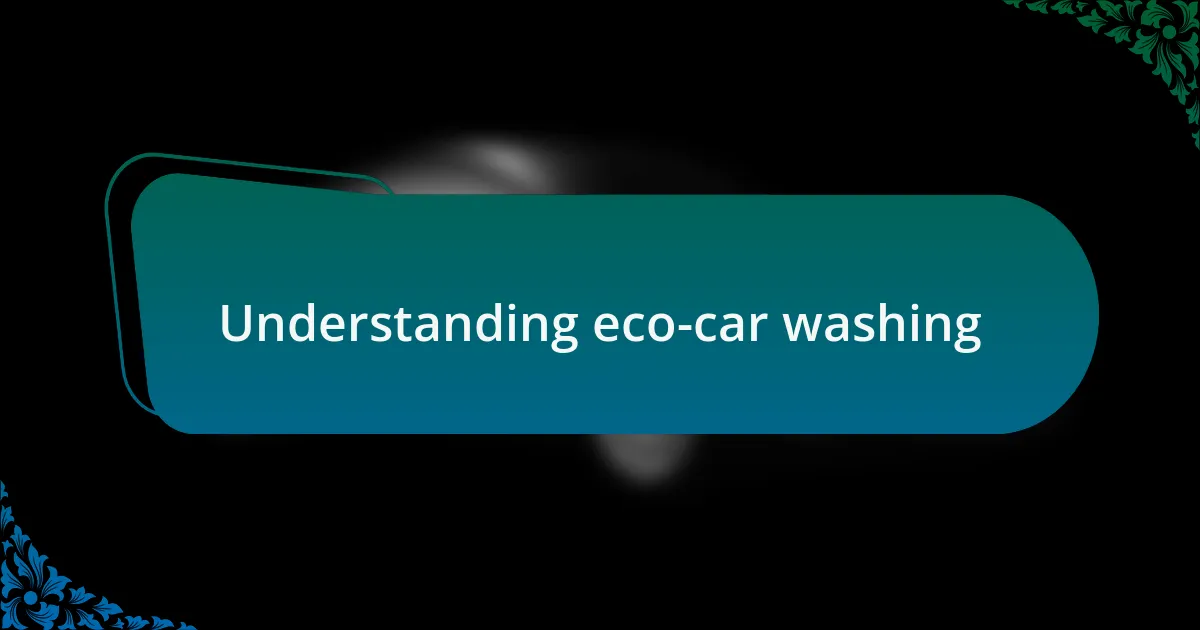
Understanding eco-car washing
Eco-car washing is more than just a trend; it’s a shift in how we view vehicle cleanliness and environmental responsibility. I remember the first time I discovered eco-friendly car wash options. I was amazed at how much water can be wasted in traditional washes. This awareness sparked an emotional connection to my own car cleaning habits—how can we continue this cycle of waste when better alternatives exist?
When we talk about eco-car washing, it’s essential to consider the materials and methods used. I’ve had the chance to try out waterless car wash solutions, and honestly, I was surprised at the effectiveness! These products often utilize biodegradable ingredients that clean without harming the environment. It makes me wonder: what more can we do when the industry embraces such innovations?
The rise of eco-car washing encourages us to think beyond just the car surface; it’s about fostering a mindset of sustainability. I often find myself sharing my experiences with friends, questioning why we should compromise the health of our planet for a spotless vehicle. It’s compelling to see how simple changes can lead to significant impacts—both for our cars and our ecosystem.

Importance of eco-friendly practices
One of the most compelling reasons to adopt eco-friendly practices is their positive impact on our environment. I recall a trip I took to the beach, where I saw firsthand the disturbing effects of water pollution. It struck me that conventional car washes often contribute to this issue, sending harmful chemicals into our waterways. Understanding how my choices can influence the health of our ecosystems has motivated me to seek out eco-friendly options.
Moreover, eco-friendly practices resonate deeply with the idea of sustainability in our daily lives. I once participated in a community clean-up event, and it became clear just how interconnected we are with our surroundings. Using biodegradable soaps during car washing isn’t just about cleaning my vehicle; it’s a small but meaningful step toward reducing my carbon footprint. It prompts me to ask, how much of an impact can individual actions make when multiplied across a community?
Embracing eco-friendly car washing also reflects our growing awareness of resource conservation. I was shocked to learn that a traditional wash can use up to 100 gallons of water. That realization helped me appreciate waterless options, which not only keep my car clean but also respect our planet’s precious resources. Isn’t it fascinating how a few thoughtful practices can align with our values and contribute to a healthier world?
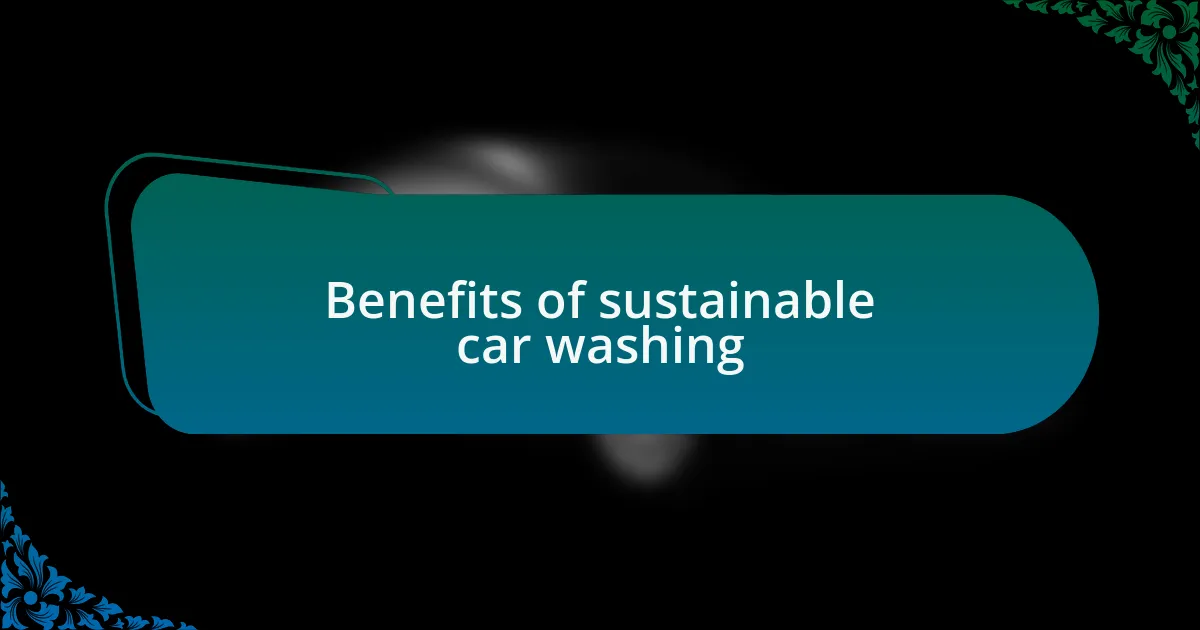
Benefits of sustainable car washing
Sustainable car washing significantly reduces water consumption, something I’ve become increasingly mindful of over time. The first time I tried a waterless wash, I felt a blend of curiosity and guilt—could it really be effective? To my surprise, it worked wonders, and knowing I used barely a quart of water made me feel like I was doing my part in this ongoing battle against water scarcity.
Beyond conserving water, the use of eco-friendly cleaning products promotes healthier air quality. I remember visiting a friend who runs a green car wash, and the fresh scent of natural cleaners was a refreshing contrast to the harsh chemical odor I was accustomed to. It’s a simple pleasure that reinforced my belief in the benefits of cleaner options—not just for our cars but for our lungs as well. Don’t you think inhaling cleaner air while washing your car is a win-win?
Lastly, there’s a sense of community and responsibility associated with sustainable practices. At a local car wash event I attended, the camaraderie among those using eco-friendly methods was palpable. We were all part of something larger—a movement toward accountability and environmental stewardship. Isn’t it encouraging to feel part of a collective effort that prioritizes our planet’s health? It fuels my commitment to sustainable car washing.
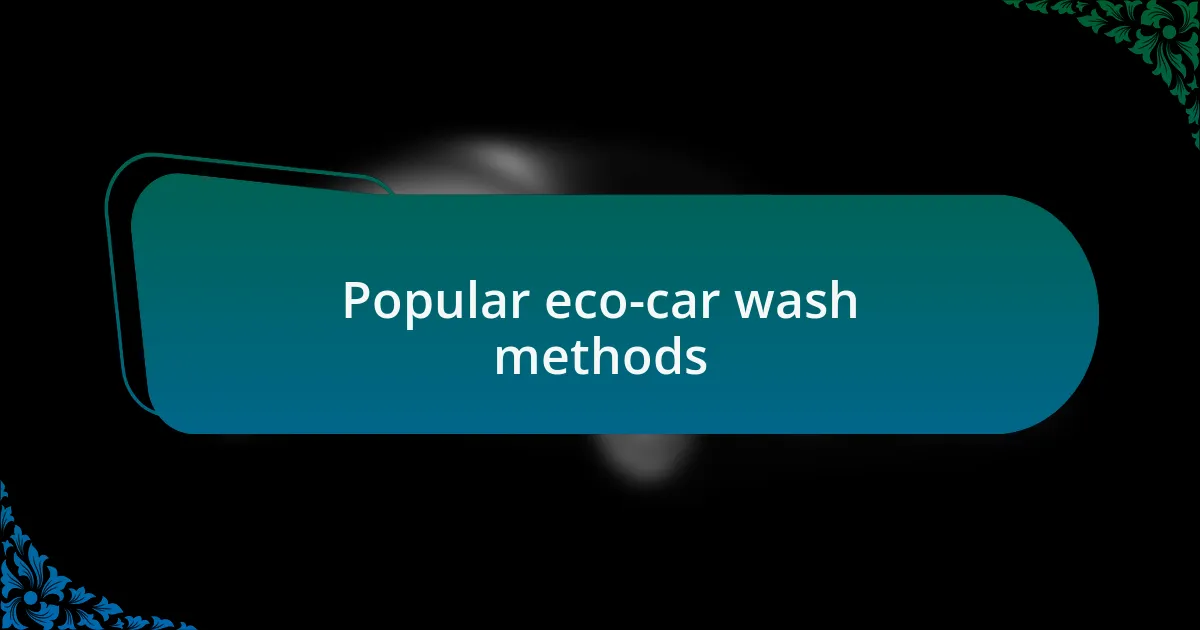
Popular eco-car wash methods
One popular eco-car wash method that has gained traction is the use of waterless products. I remember the first time I stumbled upon a waterless wash spray at an eco-friendly shop. It felt revolutionary to me. The ease of simply spraying it on and wiping it off was a game changer, especially on warm days when traditional washes often seem impractical. Isn’t it fascinating how innovation can simplify our life while also being kind to the planet?
Another interesting approach is foam washing, which uses significantly less water than traditional methods. I once visited a friend’s eco car wash that employed foam technology, and I was intrigued by how effectively it lifted dirt without wasting gallons of water. It was eye-opening to see how efficiency and environmental responsibility can go hand in hand. It’s hard not to appreciate a method that rinses away grime while saving resources; don’t you feel the same way?
Then there’s the use of biodegradable soaps, which I recently learned about during a workshop on sustainable cleaning methods. The idea of using products that break down naturally made me reflect on how often we overlook the impact of chemicals in our everyday lives. When I switched to biodegradable options at home, I felt a sense of relief knowing I was minimizing my footprint. Doesn’t it make you ponder how our choices, even in car care, can ripple out to greater environmental benefits?
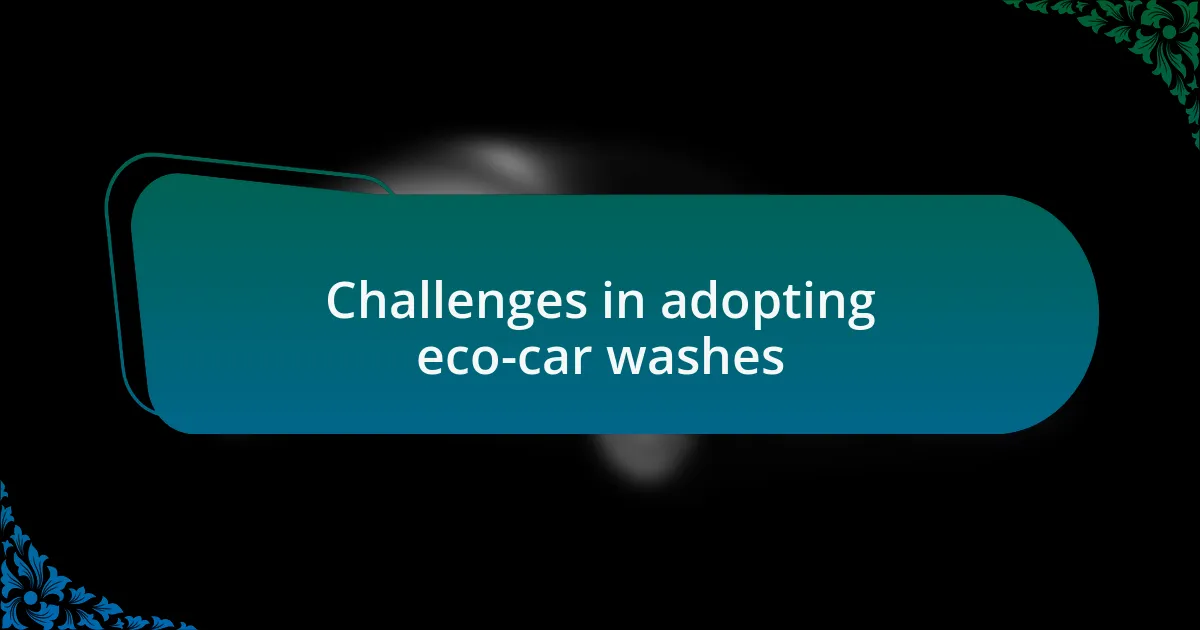
Challenges in adopting eco-car washes
One of the most significant challenges in adopting eco-car washes is the initial cost of equipment and materials. I recall a time when I helped a friend set up an eco-friendly car wash and we were astonished by the price tags on waterless systems and biodegradable products. It’s a tough pill to swallow, isn’t it? Many potential business owners may shy away just because the start-up costs feel daunting, despite the long-term savings on water and chemicals.
Another hurdle is consumer awareness. Not everyone understands the benefits of eco-car washing, and I’ve experienced this firsthand when discussing options with friends. Often, they’re stuck in their old habits, prioritizing convenience and familiarity over sustainability. It makes me wonder—how can we shift that mindset? Education plays a crucial role, but it’s a gradual process that requires persistent outreach and demonstration of the benefits.
Lastly, there’s also a perception issue surrounding the effectiveness of eco-methods. I remember chatting with a colleague who was skeptical about foam washing—she thought it couldn’t possibly clean as well as traditional washing. It made me realize that overcoming such biases is critical. If we can show people the tangible results of eco-friendly options, maybe they’ll start to reconsider their skepticism and embrace an eco-conscious mindset. What do you think would convince the doubters?
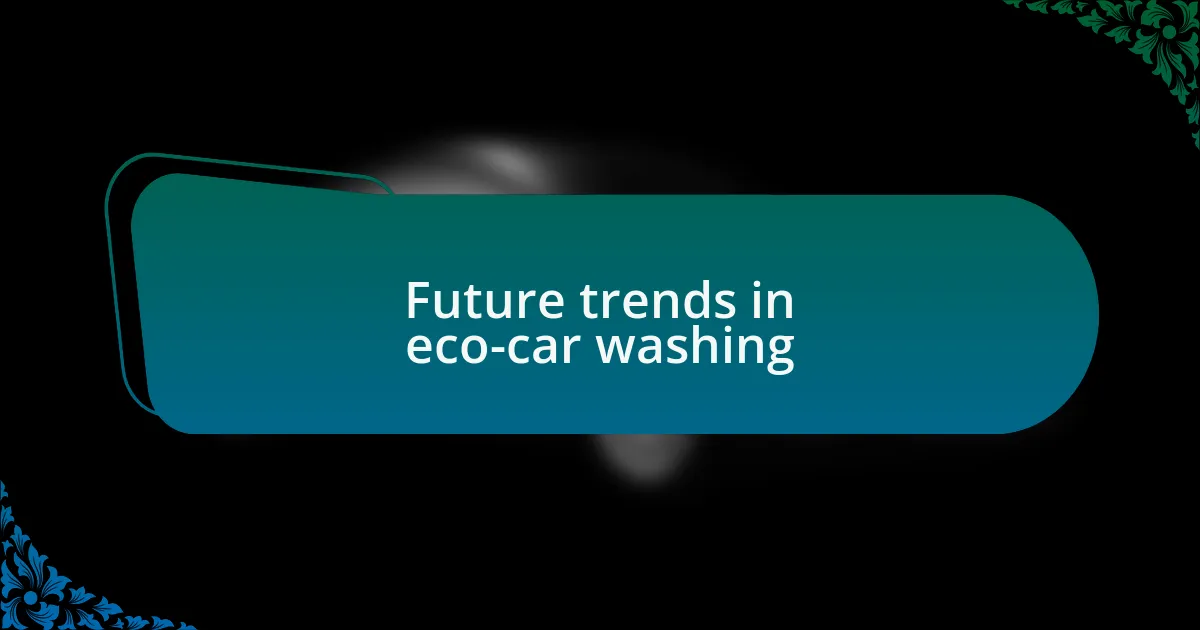
Future trends in eco-car washing
As I think about the future of eco-car washing, I’m seeing a shift towards mobile and on-demand services. Recently, I had a fantastic experience with a mobile wash that used all eco-friendly products right in my driveway. This convenience combined with sustainability is something more consumers are seeking. When will we start to see these services becoming the norm rather than the exception?
I also believe technological advancements will play a significant role in enhancing the eco-car wash experience. I once attended a workshop that showcased innovative water recycling systems. The sheer efficiency was impressive—imagine using the same water for several washes while still achieving a high standard of cleanliness! How soon can we expect those technologies to be commonplace in both commercial and DIY washes?
An emerging trend that excites me is the integration of community-driven initiatives in eco-car washing. I’ve participated in local events where businesses team up to promote sustainable practices. This collaboration not only fosters awareness but also builds a sense of community commitment to environmental stewardship. Isn’t it inspiring when everyone comes together with a common goal? The future of eco-car washing could very well be rooted in these shared efforts and collective action.